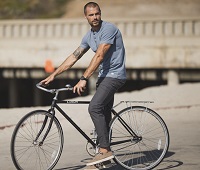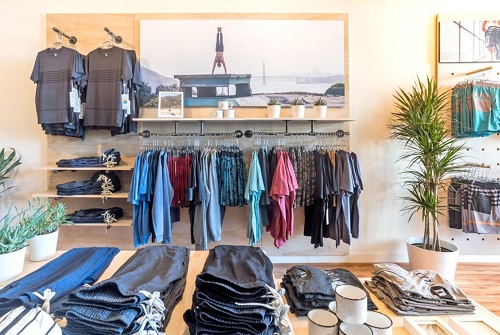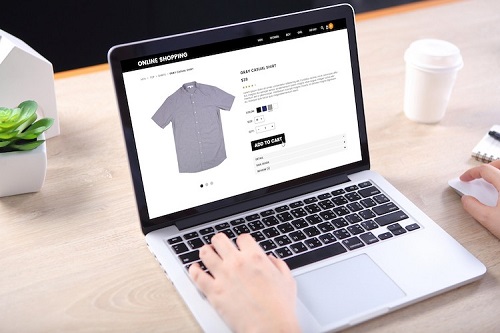FW
The Sustainable Apparel Coalition (SAC) has launched Policy Hub, and will lead an effort to align the apparel, footwear and textile industry on a European policy agenda around circular economy. It joins forces with the Global Fashion Agenda (GFA) and the Federation of the European Sporting Goods Industry (FESI) to ensure collaboration among industry partners.
The Policy Hub for Circular Economy brings together industry leaders for the purpose of deepening policy efforts that promote circular practices in the apparel, footwear and textile sector.
The Policy Hub seeks to promote and demonstrate the value of a European policy framework that accelerates circular economy in the apparel, footwear and textile industry. The hub will collaborate with a range of initiatives and stakeholders to support the industry in closing the loop of their business practices.
A survey of 35 brands and retailers published recently by the Business & Human Rights Resource Centre (BHRC) found that only 19, including H&M and Zara owner Inditex, were willing to pay for completed orders in full. According to the Workers Rights Consortium’s COVID-19 tracker these include Topshop operator Arcadia Group, Bestseller, C&A, Edinburgh Woolen Mills Group, Gap, JC Penney, Kohl’s, Urban Outfitters, Sears and Walmart-owned Asda.
Eight companies have requested retroactive “discounts” from suppliers for orders they had previously placed. Debenhams, the nonprofit pointed out, has asked for a whopping 90 percent discount. In addition, eight firms including Primark have delayed settling their bills by extending their usual payment term by up to 180 days, or six months.
Three brands—Hermès, N Brown and Zalando—said they have shortened payments for some suppliers to help ease cashflow problems during the crisis. Another 23 said they have taken steps to ensure workers are paid for March and April, and 19 companies said they are helping suppliers access financial resources.
Sports giant Adidas and niche footwear disruptor Allbirds are teaming upto develop a sports performance shoe with the lowest ever carbon footprint. The two brands will “explore innovations across their entire supply chains with the aim of developing a product to launch in 2021.
The collaborative project wants to accelerate solutions to reduce the 700m metric tons of carbon dioxide emitted by the footwear industry annually. And it will focus on all aspects of footwear production from manufacturing to the supply chain, exploring renewable material resources. Currently, the average running shoe has a carbon footprint of approximately 13.6 kg CO2, the two firms said.
And they also emphasised that they wouldn't compromise on performance, a sensible move given that a sustainable shoe that really sells needs to be one that both athletes and other consumers can wear in the same way they would less sustainable options. It accepts that consumers won’t necessarily buy something that is very planet-friendly but doesn’t do the job as well as a more polluting product does.
As part of all this, both of them will open the doors to each other’s suite of sustainable innovations and unlock the opportunity to set a new industry standard in the fight against climate change.
 The closing of brick and mortar stores across the world is proving to be a boon for online direct to consumer brands whose sales have risen almost 46 per cent since February 2020. During this period, online sales of apparels increased 29 per cent as compared to the pre-Coronavirus period.
The closing of brick and mortar stores across the world is proving to be a boon for online direct to consumer brands whose sales have risen almost 46 per cent since February 2020. During this period, online sales of apparels increased 29 per cent as compared to the pre-Coronavirus period.
A recent S&P Retail survey notes retailers who achieved 50 per cent or more of their sales through online services are faring much better than those that focus solely on offline sales. Though online shoppers are mostly opting for essential basics and activewear, they’re also going in for tailored clothing that makes them look good.
Menswear retailer Rhone significantly ramped up content on its blog, besides creating ‘Brands x Better’, a consortium of labels that banded together to donate 2 per cent sales, or 10 per cent of proceeds, to a charity or nonprofit related to the COVID-19 crisis. Initially, 24 brands signed on, including Knot Standard, Boll & Branch, Cotopaxi, Greats and Faherty, but within the first month, 120 companies had agreed to participate and the group has raised more than $3.1 million in donations so far.
Focus on marketing and consumer engagement
Similarly New York-based sneaker brand Greats launched Royale Court High sneaker during the lockdowns in April, while Bonobos one of the first direct-to-consumer men’s apparel brands, increased e-commerce engagement on its digital Guide Chat, and pivoted retail employees to serve as brand ambassadors on Instagram. Now, one-third of the company’s business comes from its own stores as well as from Nordstrom, its major wholesale partner, but two-thirds still comes through e-commerce.
apparel brands, increased e-commerce engagement on its digital Guide Chat, and pivoted retail employees to serve as brand ambassadors on Instagram. Now, one-third of the company’s business comes from its own stores as well as from Nordstrom, its major wholesale partner, but two-thirds still comes through e-commerce.
Joe Kudla, Founder and CEO of California-based men’s brand Vuori was among the first to pivot back to its direct-to-consumer roots. The brand decided to move forward with its marketing plan and after one week of an e-commerce downturn, was able to cut its cost to half and record over 400 per cent sales by the end of April.
Fourlaps, a men’s activewear brand, created a branded collection with Peloton last fall that has continued into this year. Thanks to its partnership with Peloton, the brand managed to keep merchandise flowing. And it continues to convey its message directly to customers through topical issues like mental illness.
Activewear brand Ten Thousand also experienced strong sales during the pandemic. Sales for April were up 140 per cent year-over-year and 20 per cent over March. The brand focused on its marketing to enhance profitability and soon realized that even if funding or consumer demand dried they, could still operate with just repeat business. The brand is in the process of raising more capital from existing investors and is still hoping to do a full Series A round later this year or early in 2021.
Virtual showrooms and consultations
Besides, basics and active brands, even direct-to-consumer companies focused on dress-up apparel are benefiting from the closure of brick-and-mortar retailers. Since the closure of its stores Indochino, a made-to-measure men’s brand, launched Virtual Style Consultations where customers can book a 30-minute virtual appointment with a stylist, who can help them design a suit or sport coat. Its e-commerce business has “exploded” over the last two months as people have been forced to work from home. In less than a week after the program launched, the company had booked close to 200 virtual appointments. It expects to continue the service even after the showrooms reopen.
Knot Standard, which also utilizes a showroom model for its custom tailored clothing business, has relied on its online arm to spur sales during the pandemic. Customer response to its apparels has been better than expected. Its top-selling items during the pandemic included the brand’s custom casual items such as button-down shirts, chinos and polos.
Alton Lane launched custom sneakers six weeks ago and “we saw a large amount of business” in that new category, he said. As result of its shift in focus to mask production, XSuit also posted positive results in March and April despite COVID-19. The brand is still developing advanced masks, but is also planning to offer a new utility suit at a mmore accessible price point, before branching out into ath-leisure women’s wear.
 Though apparel retail took a major hit due to the COVID-19 pandemic with sales declining by 16.4 per cent it, consumers continued to flock the online channels as they have now gotten acclimated to shopping online. Recent data provided by Quantum Metric, a SaaS platform, during this week apparel retailers generated an average weekly revenue growth rate that was 69 per cent higher than the same week in 2019. The number of orders also increased 79 per cent even though the average order value decreased by 60 per cent. The on average, weekly conversion rates also trended 29 percent higher versus the same week last year.
Though apparel retail took a major hit due to the COVID-19 pandemic with sales declining by 16.4 per cent it, consumers continued to flock the online channels as they have now gotten acclimated to shopping online. Recent data provided by Quantum Metric, a SaaS platform, during this week apparel retailers generated an average weekly revenue growth rate that was 69 per cent higher than the same week in 2019. The number of orders also increased 79 per cent even though the average order value decreased by 60 per cent. The on average, weekly conversion rates also trended 29 percent higher versus the same week last year.
Linking physical with digital
Efrat Ravid, Chief Marketing Officer of Quantum Metric attributes this success to retailers timely shift to digital channel. Ravid believes, in future when retailers begin opening their stores again, they will have to adjust to this growing quantum of online shoppers and adapt their new in-store experience to an even more digitally savvy audience. Linking physical products with digital experiences will be one of the major challenges that retailers will face.
Ravid notes retailers will have to continue to fight this challenge over the course of their journey especially as more shoppers are likely going to turn to online shopping for their future apparel purchases.
future apparel purchases.
Dealing with load time and checkout issues
One way retailers can counter this challenge is by elevating their online experience in kind. For this, they first need to deal with the issues of long load times or clunky checkout experiences that have plagued retailers since long. Retailers also need to have as much visibility of their customers as possible. This will help them determine areas where they are experiencing friction and how to prioritize issues to individual customer to ensure they have a really smooth experience.
As shoppers adapt to the pandemic, other recent studies have also been bullish on apparel sales growth. For instance, Fintech service provider ViaBill, which offers no-interest buy now pay later shopping experiences to consumers, expects fashion sales to increase by 106 per cent which is well ahead of the 50 per cent increase in computer and accessories sales and 34 per cent increase in health and wellness category.
Also expecting a growth in fashion sales is Klarna, an online shopping app, whose most recent demographic data shows that from May 3 through May 9, Gen Z and millennial app users increased their share of spending on apparel, footwear and accessories for the fourth week in a row. With more states and municipalities lifting stay-at-home orders, the retailer’s app-enabled sales at stores selling women’s accessories grew by 12 percent week over week in the week ended May 9, suggesting a revival of female shoppers.
Paris-based Spanish designer Johnny Coca has been named the director of women’s fashion leather goods at Louis Vuitton after his stint at British brand Mulberry.
Coca will become one of the primary creative linchpins for the luxury brand alongside Virgil Abloh, director of menswear and Nicolas Ghesquiere. Johnny will oversee the handbags, bespoke orders, eyewear and luxury leather products for women.
He has had a long history working with LVMH, starting his career with a professional contract during his years of education, followed by his work at the Celine design studio where he did notable work with Phoebe Philo. He was serving as the creative director of Mulberry up until 2 months ago and the company is reinforcing their creative outlook by onboarding an experienced veteran of the luxury world.
LVMH has ramped up its efforts to help the pople deeply impacted by COVID-19. Several brands under the conglomerate have participated in the charity auction organised by Fashion Journalist Laurence Benaïm’s, which benefited the ‘SOS EPHAD’ initiative launched by the Fondation Recherche Alzheimer. The funds will be used to support nursing homes, which have been greatly impacted by the health crisis.
Canadian inventor Giancarlo Beevis has partnered with Youngdo Kim, CEO of Okyung International to develop anti-viral clothing to protect against the coronavirus outbreak. The product is being developed in cooperation with the EPA at Intelligent Fabric Technologies North America (IFTNA) and is called PROTX2 AV. In lab results the product is said to have destroyed 99.9 percent of COVID-19 within 10 minutes, with residual killing power for 24 hours.
The product will perform in a similar manner to the company's antibacterial line, PROTX2. It claims to inhibit bacterial growth while retaining fabric's natural characteristics. Companies across the globe are rushing to capitalize on this new technology, considering applications of this antiviral chemical on PPE, military clothing, travel wear, and everyday items, too.
It is unclear whether clothing will all have the substance pre-applied, or whether treatments will mirror an early discussion about antiviral laundry additives, but it's likely both options will eventually become available. One example we can draw some conclusions from is that of Scotch Guard, which is applied as a spray. No matter how it gets to us, antiviral clothing has the makings of big business. The antimicrobial textile market is on track to surpass $20.5 billion by 2026.
As India is losing its competitive edge in global textile and apparel sector, the government has decided to engage a consultant to improve the county’s performance. The Textiles Ministry will hire a consulting firm to identify new opportunities for market expansion, maintain a database on international tariffs, trade data, growth trends, impact of international agreements and free trade agreements, installed capacity, production and employment in the sector.
It will also provide inputs for promotion of foreign direct investment especially in textile parks, and intellectual property rights issues including geographic indications in textiles and handicrafts. Besides it will assist the ministry in sensitising Indian industry of the global market scenario and emerging trends to help identify new opportunities for market expansion.
A section of garment workers in India have received wages thanks to pressure from the US and EU-based international agencies on apparel brands that have outsourced production to garment factories in India.
Organizations such as United Students Against Sweat Shops and the Workers Rights Consortium have brought intense pressure on leading global brands to ensure that workers are paid in factories in Bengaluru, said the Garments and Textile Workers’ Union (GATWU), which has worked on similar lines in the past to improve working conditions. Not only are factories being forced to pay wages, international agencies have ensured that leading apparel brands do no cancel their orders, which in turn could harm the factories finances’ to pay wages.
With three factories in Bengaluru having closed already in the past month, workers in the garment sector are going through anxious times. While the current work is related to previous orders, fresh orders for the city’s garment sector, whose peak season starts from July, are still to come in.
Punjab apparel industry leaders are set to fulfill the shortage of PPE kits in the country by diverting their production to manufacturing the much needed protective gear worn by health and sanitation professionals to minimize exposure to the deadly infection.
Around 58 PPE suit manufacturers in Punjab, 54 of which are based in Ludhiana, have obtained certification from South India Textiles Research Association (SITRA) or Defence Research and Development Organisation (DRDO) for the manufacturing of these kits.
These 58 manufacturers already have orders for lakhs of PPE kits and their existing capacity is more than the requirement in India. Hence, the Punjab industries minister Sunder Sham Arora has urged Union minister of commerce and industry Piyush Goyal to allow the exports of these kits to other countries.












